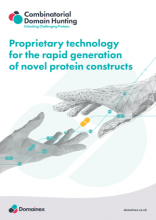- About
-
Solutions
-
Services
- Biosciences
- Chemistry
- Integrated Drug Discovery
- Computer Aided Drug Design
- Hit Identification
- DMPK
- Target Classes and Modalities
- Therapeutic Areas
-
A-Z
- A
- B
- C
- D
- E
- F
- G
- H
- I
- K
- L
- M
- N
- O
- P
- R
- S
- T
- V
- X
-
Services
- Library
- News & Events
- Careers
CDH (Target Gene Fragmentation)
Proprietary high throughput approach enables fast screening of novel domains

Our patented Combinatorial Domain Hunting (CDH) technology quickly identifies soluble, highly expressed domain constructs of proteins by combining semi-random gene fragmentation with efficient screening of the resulting protein fragments.
CDH Benefits
In situations where expression of your protein target is very challenging, finding just the right expression construct can solve the problem. Standard bioinformatics approaches to construct design are unlikely to be suitable. This is because whilst bioinformatics can make good predictions within well-conserved regions of a protein, these do not always translate into the best protein constructs for production in recombinant expression systems. In these cases, Domainex's proprietary high-throughput CDH approach can overcome this issue, by enabling the fast screening in parallel of up to 100,000 different constructs of your protein domain of interest!
Domainex's technology has been used successfully to deliver stable, soluble protein for a range of target classes including, but not limited to:
- Kinases
- DUBs
- Proteases
- Methyltransferases
- Demethylases
- Transcription factors
CDH Technology
CDH is our unique approach that you can access to identify quickly soluble, highly expressible constructs of drug target proteins that have well-defined structure and are suitable for use in structural studies and/or assay development. This opens up the possibility to develop drug target binding or activity assays that may not have been possible previously or to generate crystal structures for otherwise unprecedented targets.
CDH combines a method for the production of finely sampled gene-fragment libraries, with a screening protocol that provides readouts on solubility, molecular weight and relative expression levels for up to 100,000 protein domain constructs.
CDH has an established pedigree: over 60 human genes have been studied to date, including projects for many of the 'Top 20' global pharmaceutical companies (click here to view a UCB/Domainex press release on the successful use of CDH technology), biotechnology companies, academic groups (MLL Family SET Domain) and patient foundations.
The construct selection process takes only three months, with an additional one to two months for protein scale-up and purification. This can remove the 'protein expression bottleneck' from your early discovery programs. Following construct selection from up to 100,000 possible variants, the most optimal protein constructs will be utilised in E. coli or baculoviral expression systems, as is deemed necessary to generate your first batch of at least 1 milligram of crystal-grade protein.
CDH2
Domainex has developed a variant of CDH for exploring protein-protein interactions (PPI) known as CDH2. This allows us to carry out CDH on one protein (P1) to identify its stable domains, then to do the same thing on the second protein (P2) in the PPI, but this time we screen the fragments of P2 in the presence of the selected stable fragments of P1. This allows us to map the regions of P1 and P2 that form the PPI, and because of the way we do the screen, we can identify fragments of P2 that are only stable (and correctly folded) in the presence of P1. An example of this is described by Savva et al.1
For a selection of CDH case studies please click here. Examples include a kinase target, a methyltransferase and a DUB target.
Reference
1. A combinatorial method to enable detailed investigation of protein–protein interactions; Kate Maclagan, Rita Tommasi, Emmanuelle Laurine, Chrisostomos Prodromou, Paul C Driscoll, Laurence H Pearl, Stefanie Reich and Renos Savva. Future Med. Chem. 2011, 3(3), 271–282

Download the Brochure
We provide a comprehensive protein characterisation service. At its heart is our patented Combinatorial Domain Hunting (CDH) technology which has been applied to a range of targets, including DUBs, epigenetic targets (incl. Lysine, Arginine and RNA methyltransferases), metalloproteases, polymerases, transcription factors and biologics, with an overall success rate in excess of 90%. CDH couples random DNA gene fragmentation to efficient screening of resultant protein fragments to identify soluble protein domains for a range of applications...
Start your next project with Domainex
Contact one of our experts today